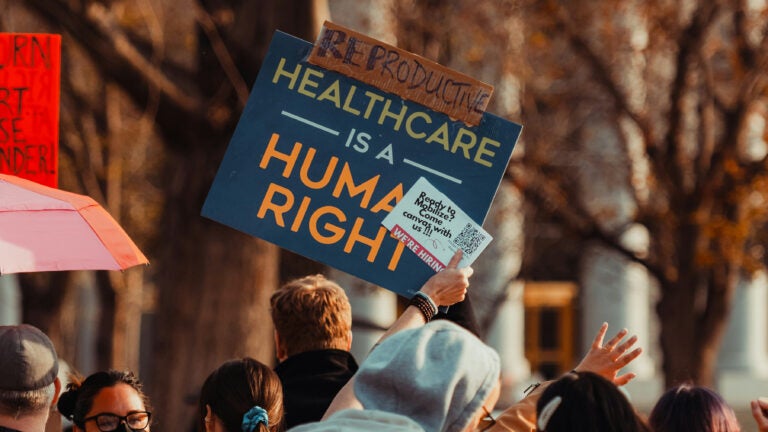
The rollback of ‘Roe v. Wade’ — 1 year later
The impact, still rippling outward, continues to roil politics and disrupt pregnancy care.
Saturday will mark one year since the U.S. Supreme Court ended federal protections for abortion when it issued its ruling on Dobbs v. Jackson Women’s Health Organization.
In overturning Roe v. Wade, the court returned the power of regulating abortion to individual states and reignited fierce debates. The repeal of this long-standing precedent triggered an outpouring of emotion nationally and globally.
The decision emboldened states already seeking to restrict abortion, resulting in near-total bans in more than a quarter of states. Lawyers and judges are now questioning the legal status of an FDA-approved medication, mifepristone, commonly known as the abortion pill.
Brian Nguyen, an associate professor of clinical obstetrics and gynecology at the Keck School of Medicine of USC, says the restrictions amount to a “a continuous assault not only on women’s reproductive rights, but on women’s welfare.”
Citing research by the Society of Family Planning, Nguyen said the number of abortions provided dropped by more than 40,000 in the six months after the ruling. Meanwhile, the number of abortions in states where abortion remained legal increased by more than 10,000.
Clearly, restrictions on abortion access do not influence the public need for abortion.
Brian Nguyen, Keck School of Medicine
“Clearly, restrictions on abortion access do not influence the public need for abortion,” Nguyen said. “Legal restrictions do not just mean that some women are unable to access abortion, but that women are harmed by having to continue pregnancies that carry significant risk to their health. News reports in abortion-restrictive states have documented several cases of women having to wait to have an abortion until they were septic or hemorrhaging or having to carry and deliver nonviable pregnancies.”
Roe v. Wade — 1 year later: Impact on victims of sex trafficking
The ramifications of the decision on women and girls who are the victims of sex trafficking — a largely unseen yet extremely vulnerable population — will result in increased unwanted pregnancies, according to Annalisa V. Enrile, a teaching professor of social work at the USC Suzanne Dworak-Peck School of Social Work.
Childbirth and pregnancy become levers of power for traffickers, especially if the father of the child is the trafficker.
Annalisa V. Enrile, social work professor
“The inability to control reproductive health falls heavily on poor girls and women and provides opportunities for traffickers to take advantage of their vulnerabilities. Childbirth and pregnancy become levers of power for traffickers, especially if the father of the child is the trafficker,” Enrile said. “There will definitely be an increase in unwanted pregnancies as a majority of sex trafficked women and girls are not allowed to use condoms or other birth control. Sadly, there will also be an increase in the selling of unwanted children and the trafficking of unwanted babies through illegal adoption or sex trafficking.”
Political impact of Roe v. Wade — 1 year later
As repercussions for women continue to unspool, political observers predict the issue will continue to affect elected officials. While the majority of the country is pro-choice — recent reports from the Pew Research Center found that 62% of Americans favor legal abortion in most or all cases — some state legislatures are imposing roadblocks to prevent abortion policies more reflective of their electorate, said John Matsusaka, professor of finance and business economics at the USC Marshall School of Business.
Many states are still in the process of establishing their own new, updated abortion laws.
John Matsusaka, USC Marshall
“One year later, many states are still in the process of establishing their own new, updated abortion laws. Initiatives continue to play a big role in the 24 states where they are available, as voters use direct democracy to counteract what they perceive as extremism from their elected officials,” said Matsusaka, an expert on direct democracy. “Ohio is a key state to watch: An initiative is on the ballot in 2024 to bring a more centrist abortion policy, but the legislature is trying to stack the deck against the initiative by requiring an increased approval rate to pass an initiative.”
“The political impact is also huge,” said Christian Grose, professor of political science and public policy at the USC Dornsife College of Letters, Arts and Sciences. “The Dobbs decision helped Democrats in the 2022 midterms, and I anticipate the rollback on abortion will energize Democratic voters in the 2024 election as well.
“Combined with redistricting that was more favorable to Democrats in 2022 than in earlier decades, Republicans may be on defense. Trump’s three judicial appointees handed anti-abortion activists their most sought-after victory, but there may also be an electoral backlash at the polls in 2024.”



